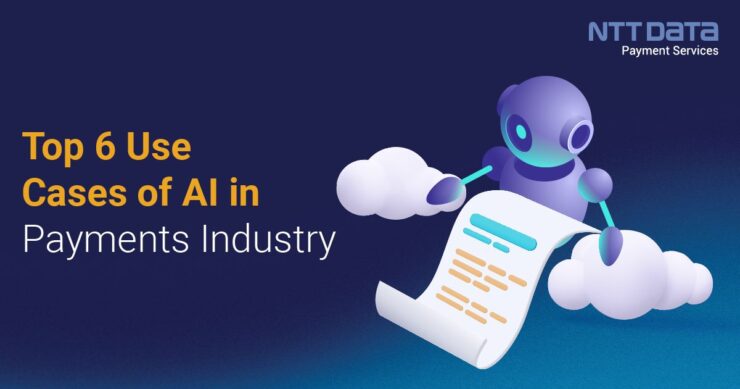
Table of Contents
Artificial intelligence is becoming widely used in payment processing to improve efficiency, security, and customer experience. As digital payments rise globally, the need for efficient, quick, and secure transactions has never been greater. AI is revolutionising the payments industry by addressing key issues around speed, security, and user experience through advanced algorithms and automated processes.
In this blog, we will explore the top 6 use cases of AI in payments industry and how they are revolutionising this critical sector.
Overview of AI in Payments Industry
Artificial intelligence is transforming industries at a rapid pace, and the payments sector is no exception. As AI continues to advance, it enables innovative solutions that improve the payment experience for businesses and consumers.
According to a report by Mordor Intelligence, the AI payment market is expected to grow at a CAGR of over 20% between 2022 and 2027. This growth is being driven by the ability of AI to enhance key areas of payments like fraud detection, customer service, underwriting, and more.
Recent Web Stories
Top 6 Use Cases of AI in the Payments Industry
1. Cyber Fraud Detection and Prevention
Fraud prevention has always been a top priority for payment providers. AI is helping to take fraud detection capabilities to the next level by analysing vast amounts of transaction data and detecting complex patterns that may indicate fraudulent activity.
Machine learning algorithms can analyse thousands of data points in real time, including device IDs, location data, transaction velocity, and purchasing history, to recognise abnormal behaviour. This helps payment providers quickly flag potentially fraudulent transactions for further review before any money is lost.
Companies like Mastercard use AI-powered fraud detection platforms that leverage billions of historical transactions to identify risks. Such advanced fraud detection systems have significantly reduced payment fraud while minimising friction for genuine customers.
2. Customer Service Through Chatbots and Virtual Assistants
Chatbots and virtual assistants powered by natural language processing are revolutionising customer interactions in the payments industry. Conversational AI is helping payment firms address a wide range of common customer queries without human intervention. Customers can now get instant assistance regarding account balances, payment due dates, transaction disputes, and other issues by simply having a conversation with an AI assistant. This has substantially lowered call centre volumes while improving 24/7 support accessibility.
For example, PayPal’s AI assistant “PayPal Claude” handles over 30 million customer requests annually across the web and mobile. Such AI-driven assistants are enhancing the payment experience through personalised, on-demand, and frictionless customer service.
3. Credit Decisioning and Underwriting
AI is enabling more accurate credit risk assessment and underwriting capabilities. Machine learning models can analyse diverse data sources including financial transactions, demographics, credit bureau reports, and device/behavioural data to evaluate risk profiles This helps payment providers make real-time underwriting decisions and credit limit adjustments.
It also facilitates inclusion by considering non-traditional data points for consumers with limited credit histories. AI-powered underwriting models are proven to approve 20% more applicants while maintaining similar default rates.
Stripe has developed powerful ML algorithms that analyse over 1,500 variables to assess merchant risk levels and optimise underwriting decisions across 200+ countries in real time. Such AI-driven underwriting improves approval rates as well as portfolio quality.
4. Personalised Offers and Recommendations
Leveraging AI, payment firms can gain a unified view of customer preferences and behaviorus across channels. This enables highly personalised recommendations, offers, and loyalty programs that strengthen customer relationships.
Machine learning algorithms to analyse past purchases and online activity to develop individual customer profiles. AI then identifies suitable payment products, value-added services, upcoming deals and purchase suggestions tailored to each customer’s unique needs and interests.
American Express leverages AI extensively to power its recommendations engine. By understanding individual spending patterns, the platform suggests perfect travel destinations, dining spots, and entertainment options tailored to each customer’s tastes. This has boosted customer engagement, retention, and average spending.
5. Streamlined Processing and Settlement
AI is helping to automate repetitive payment processing tasks and optimise workflows for higher volumes. For instance, optical character recognition (OCR) and natural language processing (NLP) can extract key fields from invoices to enable touchless processing. Machine vision coupled with ML expedites check deposits by recognising amounts, dates, and signatures.
Settlement times are also getting reduced as AI predicts cash flow requirements in real time based on historical patterns and current account activity.
FIS leverages AI throughout its payment processing platform. Automated workflows have delivered up to 60% faster processing while cutting costs by 30%. This has significantly improved operational efficiencies for banks, fintechs, and merchants.
6. Data-Driven Insights for Innovation
Leveraging AI, payment firms are generating real-time insights from massive transaction data stores. This helps identify new revenue opportunities, demand trends, spending patterns, and areas that need improvement.
AWS Machine Learning solutions are powering data analytics at Visa to gain unique behavioural insights. For example, Visa’s AI detected a surge in online gaming & streaming subscriptions.
| Did you know? AI is expected to generate $1.2 trillion in business value and save businesses over $1 trillion per year by 2035, according to Accenture. A large part of this will come from cost savings and efficiencies brought about by AI applications in industries like payments. |
Secure your Online Payments with NTT DATA
AI is revolutionising various aspects of the payments industry from fraud prevention to customer service to underwriting. NTT DATA Payment is continuously investing in technologies like advanced analytics, computer vision, and payment processing to solve complex business problems.
NTT DATA Payment Services offers a complete payment solution to advance both your offline and online businesses from,
- Online Payment Gateway
- POS machines
- IVR payments
- Mobile applications, and
- Bharat QR Scan and Pay
We ensure maximum comfort, convenience, and safety for all your payments.
The Future of AI in Payment Industry
As AI and machine learning algorithms become more sophisticated through continued learning and the growth of big data, their applications in payments are expected to multiply. Beyond risk management and customer service, AI will increasingly optimize back-end operations around processing, reconciliation, and settlements.
As transaction volumes continue surging and security risks escalate, AI has become pivotal in helping payment firms address these challenges and meet evolving business and consumer needs.
| Also, you can get frequent updates on nttdatapayments Instagram page. |
Frequently Asked Questions (FAQs)
- How is AI used in the payment industry?
AI is used in the following ways in the payment industry:
- Fraud detection
- Customer service
- Credit limit decisions
- Personalised offers and recommendations
- Streamlining payment processing
- What are the use cases for AI in the financial services industry?
Some key use cases of AI in financial services include:
- Automated customer service via chatbots
- Predictive analytics for customised offers
- Biometrics for identity verification
- AI assistants for accounting/tax purposes
- What are the benefits of AI in payments?
Key benefits of AI in payments include:
- Improved fraud detection rates
- Faster transaction times
- Enhanced customer experience
- Optimised payment acceptance
- What are some challenges of AI adoption in finance?
Some challenges of AI adoption in finance include:
- Lack of quality data
- High costs of implementation
- Risks of algorithmic bias
- Regulatory compliance complexities
- What are the use cases for generative AI in payments?
Generative AI can power conversational agents for payment customer support. It can also generate financial documents, personalise offers and marketing content, detect financial crimes, and reduce false declines through augmented analytics.







